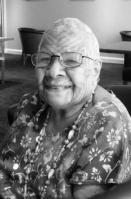Ethel Dreda Arek

In this interview Ethel Dereda Arek provides personal insights into her married life with teacher, trade unionist and politician Paulus Arek (1929-73) who was Minister for Information in the lead up to self-government in 1973.
| Time | Summary | Keywords |
|---|---|---|
| 00:00:00 |
Jonathan Ritchie welcomes Ethel Dreda Arek to the interview at the Port Moresby Nature Park on 10 January 2018. In attendance is her son Matthew Arek. |
|
| 00:01:08 |
Ethel Arek describes her background, saying she grew up in Wanigela and was educated there at the Anglican Mission. She states her father was a village chief and also a church councillor. |
Wanigela |
| 00:03:11 |
Ethel Arek says that at home they had a garden, and she worked hard and was taught honesty, hard work and respect by her parents. |
|
| 00:05:18 |
Ethel Arek states that her husband Paulus Arek was also from Wanigela. She states that he received his primary education at the local mission school and then went to the Sogeri school. She says that when he returned to the village for his holidays they arranged to get married. |
Paulus Arek, Sogeri High School, Wanigela |
| 00:07:10 |
Ethel Arek relates that the Education Department had problems with the schools at Manus Island and so transferred Paulus Arek there in 1954. She describes the fighting between the mission schools and the government schools and the problems attracting teachers. |
Baluan Island, Department of Education, Manus Island |
| 00:09:32 |
Ethel Arek relates that Paulus Arek was teaching at Sogeri High School when the Director of Education called him down to go to Baluan Island. She describes that she went to stay with the Groves in Port Moresby to test her 'suitability' for marriage to Paulus Arek when she was 19. |
Baluan Island, Department of Education, Sogeri High School, William Groves |
| 00:13:45 |
Ethel Arek states that she married Paulus Arek at Central Church in Port Moresby, and after three weeks they went to Baluan Island. She describes the work her husband did to sort out the problems between the mission schools and government schools there after which her husband was transferred to Popondetta. |
Baluan Island, Donald Cleland, Popondetta, Rachel Cleland |
| 00:17:02 |
Ethel Arek states that each region had the same trouble between mission and government schools, and they transferred from Popondetta to Kerema in 1957 and then to Daru. |
Daru, education, Iokea, Kerema, school |
| 00:19:02 |
Jonathan Ritchie introduces part two of the interview conducted at the Holiday Inn Hotel, Port Moresby on 11 January 2018 and summarises part one. |
|
| 00:20:28 |
Ethel Arek remembers the public service rules. She states that they went from Kerema to Daru and describes the beginning of Paulus Arek's political career and his choice of standing for politics in 1963 in Popondetta and the reasons he lost in the 1964 elections. |
1964 election, Daru, Kerema, Paulus Arek, political campaign, Popondetta, public sector |
| 00:22:56 |
Ethel Arek states that after the election loss Paulus Arek returned to teaching primary school in Popondetta where he became headmaster and also started the Northern District Workers' Association to support plantation workers. She also describes the foundation of the Popondetta Workers' Club to get control over workers' drinking and the running of the club. |
alcohol, Northern District Workers' Association, Paulus Arek, Popondetta, Popondetta Workers' Club, teaching, union movement, wages |
| 00:26:32 |
Ethel Arek discusses her husband Paulus Arek buying shares in Bougainville Copper Mine for the Popondetta Workers' Club in 1967 and reselling them knowing that there was going to be trouble for the mine in the future. |
Bougainville Copper Mine, Popondetta Workers' Club |
| 00:32:20 |
Ethel Arek describes the time in 1968 that her husband was summoned by the District Commissioner David Marsh to go to a meeting to discuss joining New Guinea and Papua where John Maneke represented New Guinea and Paulus Arek represented Papua. On the agenda was Independence which Paulus thought PNG was not yet ready for. |
David Marsh, independence, John Maneke, Paulus Arek, United Nations |
| 00:35:02 |
Ethel Arek recalls that after the 1968 meeting Paulus Arek was sent to Africa with John Maneke to study independence and make recommendations, but he still considered PNG was not ready for independence due to language and other differences. |
Africa, independence, John Maneke, Paulus Arek |
| 00:37:17 |
Ethel Arek recalls that her husband Paulus Arek was appointed as Chairman of the Select Committee on the constitution in 1969. |
Constitution, Paulus Arek |
| 00:38:56 |
Ethel Arek explains that Paulus Arek was not a member of the Pangu Party but an independent. She discusses the membership of the Select Committee on the constitution. |
Constitution, Pangu Party, Paulus Arek, political independent |
| 00:40:36 |
Ethel Arek discusses the acknowledgment of her husband's work by the Education Department. |
Department of Education, Ken McKinnon, Paulus Arek |
| 00:41:22 |
Ethel Arek explains her family's living arrangements, firstly in education house in Popondetta, and then when she was sent back to Wanigela in 1969 with her children to free her husband to travel. |
Popondetta, Wanigela |
| 00:43:35 |
Ethel Arek explains that Paulus Arek submitted his constitution report for debate in the House of Assemby on 4 March 1971 and then stood again at the 1972 election. She remembers that after the 1972 election when he was made Minister for Information she and the children returned to Popondetta. |
1972 election, Constitution, Minister for Information, Paulus Arek, Popondetta |
| 00:46:52 |
Ethel Arek recalls that at the end of 1972 Paulus Arek travelled to Indonesia and Malaysia to study broadcasting with Australian Broadcasting Commission members. |
Australian Broadcasting Commission, Indonesia, journalism, Malaysia, Minister for Information, Paulus Arek |
| 00:48:08 |
Ethel Arek describes her husband as a hard worker, an honest, disciplined man who had great respect for government property and authority. She remembers not being allowed in his car unless it was for an official work function. |
Paulus Arek |
| 00:49:42 |
Ethel Arek remembers her husband's promises to his electorate and his fierce loyalty to his God, his people and his country. |
Paulus Arek |
| 00:50:20 |
Ethel Arek remembers being frightened by the promises that her husband makes to serve his God, his people and his country. She states that she must work hard so that he can honour his promises. She describes her domestic situation of hard work with no electricity, hand washing, hurricane lamp and keeping her children at school. |
|
| 00:52:11 |
Ethel Arek describes her rising at 6 o'clock everyday, waking her husband at 6.30 am and his repeating his mantra of 'Time will not run for me, I will run for time' every day to her. She describes her obedience, honesty, hardwork and respect for him. |
|
| 00:53:04 |
Ethel Arek describes the changes to her daily life once her husband entered politics as she needed to be on alert all the time and pack for him to travel. She remembers that he was full of worries, but that she never interfered or disturbed him. |
|
| 00:55:05 |
Ethel Arek recalls that her husband Paulus Arek became ill in 1973 and was admitted to the Port Moresby General Hospital, Intermediate Ward, where he continued working using a telephone in his room. |
Minister for Information, National Broadcasting Commission, Paulus Arek |
| 00:57:04 |
Ethel Arek describes a visit to her husband in hospital by Michael Somare ten days before self government. She says that her husband asked Somare to leave an empty chair for him to join them in spirit. She states that he completed his work to establish the National Broadcasting Commission before Independence. |
Michael Somare, National Broadcasting Commission, self government |
| 00:58:46 |
Ethel Arek remembers the Thursday morning 22 November 1973 when her husband woke up in hospital and asked her to take him out to the verandah. She recalls that a mysterious visitor helped her take her husband outside, once there he asked the Sister in charge to assemble all the other patients where he addressed them about the forthcoming self government. |
Paulus Arek |
| 01:04:55 |
Ethel Arek describes Paulus Arek's state of mind on returning to his hospital bed when he asked that the room be cleaned for visitors, and that by the evening he passed away. |
Paulus Arek |
| 01:06:40 |
Ethel Arek describes his dedication to his people, his work for self government and the National Broadcasting Commission and his funeral service. She states that before he died he asked her to be ready to leave their government house with only her children. She states that she had no money and nowhere to go and was given two weeks notice to leave by government officials in December 1973. |
National Broadcasting Commission, Paulus Arek, self government |
| 01:12:24 |
Interview ends |
Diane Langmore, 'Arek, Paulus (1929–1973)', Australian Dictionary of Biography, National Centre of Biography, Australian National University, http://adb.anu.edu.au/biography/arek-paulus-9378/text16475, published first in hardcopy 1993
Biography

Ethel Dreda Arek
Ethel Dereda Arek was born in Wanigela. She was educated at the Anglican mission school. A village girl, at home she learnt the value of hard work, discipline and respect, aspects she later applied to her married life. She married teacher Paulus Arek, having first been ‘approved’ as a suitable wife for an educated man by the Director of Education Dr William Groves. She moved with her husband when he was posted to Baluan Island, and later Popondetta, Iokea and Daru. Paulus Arek (1929-73) unsuccessfully contested the seat of Popondetta at the 1964 elections. A teacher and a trade unionist he founded the Northern District Workers’ Association and the Popondetta Workers’ Club. He was elected as an Independent at the 1968 elections and was appointed as a representative to the UN Assembly where a resolution was put forward for PNG independence. He travelled to African countries to explore independence options, but remained convinced that PNG was not yet ready. In 1969 he was appointed chair of the select committee on constitutional development. Re-elected in 1972, Michael Somare appointed him Minister for Information in his coalition government where he oversaw the creation of the National Broadcasting Committee.
Following her husband’s death in November 1973, just prior to self-government Ethel Arek and her children were given two weeks to vacate their government house and return to Popondetta.
In early 2018 she and her son Matthew Arek loaned her family resources including photographs, books and press cuttings to the National Museum and Art Gallery for an exhibition as a tribute to her husband and others for the work they accomplished during the self-government period.
Copyright © Papua New Guinea National Museum & Art Gallery, 2018
The copyright holder of this material grants users permission to access the material on this website for the following purposes only: research and study, education, other non-commercial and non-public uses.




